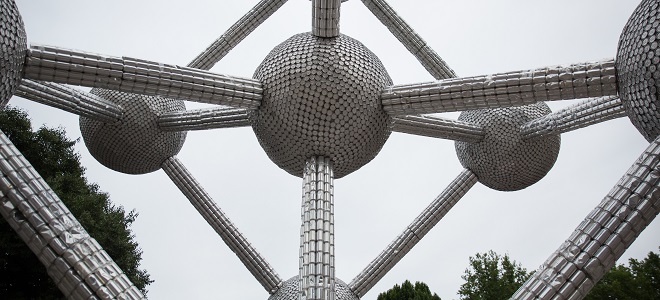The Brussels Atomium, with its 2000 kg of recycled aluminium pipes, beverage cans and lids, is in Bologna, in XX Settembre Square, for the #All4thegreen week of the G7 Environment.
The maxi reproduction of the famous monument situated in the Belgian capital – executed on a scale of 1:10 using the equivalent of 160,000 beverage cans obtained from the CIAL, Italian Consortium for the Recovery and Recycling of Aluminium – was inaugurated on monday, june 5th, World Environment Day, in the presence of the Italian Minister for the Environment, Gian Luca Galletti, the Councillor for Town Planning and the Environment of the City of Bologna, Valentina Orioli, and the General Manager of the CIAL Consortium, Gino Schiona.
[youtube src=”fQxhAAfrHCQ”]
As the European symbol of rationality, of cooperation between peoples, and of the new frontiers of scientific research and sustainability, the Atomium of Bologna (#atomiumbologna), with its supporting structure consisting of aluminium pipes, is 11 m high and has an 8 m base and a 9 m circumference. Moreover, the tubes are covered with beverage cans, and the spheres with the tops of cans.
The giant installation – which is a faithful reproduction of the futuristic 102 meter high building in Brussels – will be on display for a full week, until the G7 ends on June 12th.
The reproduction of the Atomium is part of a group of large symbolic monuments made using cans with the collaboration of the CIAL Consortium. Together with all the previous giant reproductions, the Atomium represents the value of recycled aluminium.
“This maxi “recycled” Atomium produced using aluminium cans reminds us of the importance of sorrting waste,” said the Minister for the Environment, Gian Luca Galletti. “In recent years, the increased collection of recyclable aluminium has allowed us to reach – and indeed exceed – the objectives set by European legislation. Italy ranks first place in Europe, with over 927,000 tonnes of recycled scrap.”
“This large atom made of recycled cans,” said Valentina Orioli, Councillor for Town Planning and the Environment of the City of Bologna, “reminds us – especially today, on World Environment Day – of the importance of waste collection and recycling to reduce the impact of refuse on the environment. Atomium represents a shared commitment to increasingly farsighted waste management, so as to ensure a better future for the ecosystem and for our cities.”
The Atomium was created by AIDO, a voluntary association based in San Bonifacio, Verona, with the support of CIAL, and all proceeds will be donated to the association for social purposes.
Before the Atomium, CIAL contributed to the reproduction of the Arena of Verona (1989), the Teatro alla Scala in Milan (1989), the Basilica of Saint Anthony in Padua (1992), the Basilica of St. Peter and The Colosseum in Rome (1997 and 2000), the Royal Palace of Caserta (2000), the Royal Palace and the Castel Nuovo in Naples (2000 and 2001), and the Arch of Augustus in Rimini (2002).
The collaboration between CIAL and AIDO is neither random nor extemporaneous: as part of the Raccolta Solidale project, CIAL has long been collaborating with the most diverse voluntary associations throughout Italy, to which the Consortium pays a fee for collecting aluminium and raising awareness among citizens.
“The collaboration between CIAL and the volunteering world,” explained the General Manager of the CIAL Consortium, Gino Schiona, “is one of the most interesting methods for promoting and developing a culture of environmental sustainability, with a view to protecting the environment and its natural resources; a method that becomes even more worth while if we consider its underlying social purpose.”
[youtube src=”rxv9onH4fDY”]

